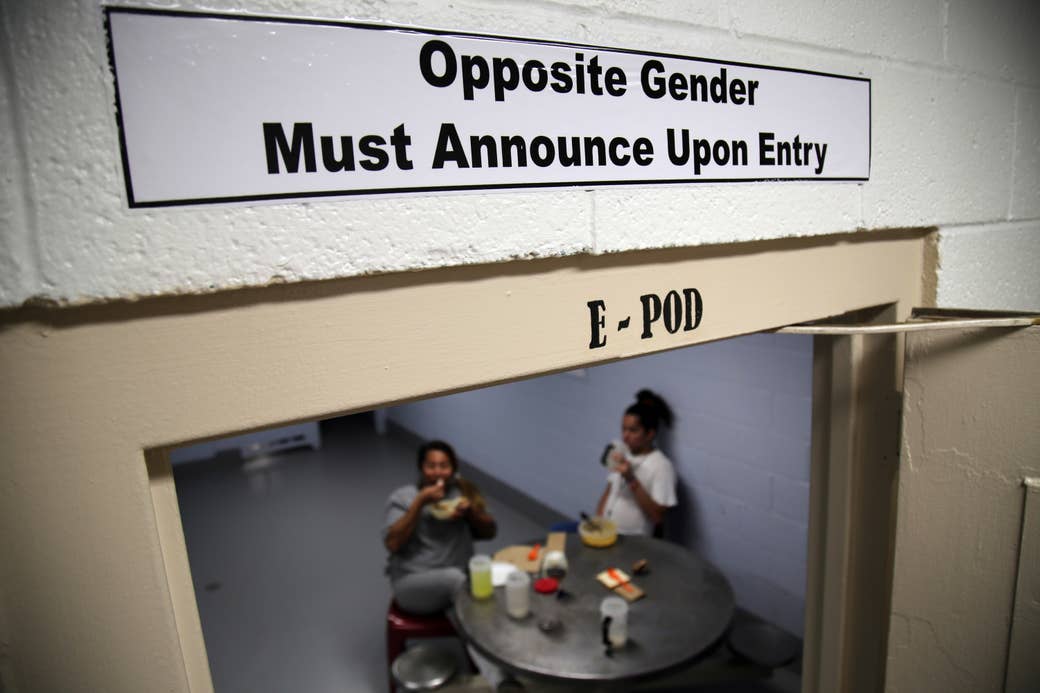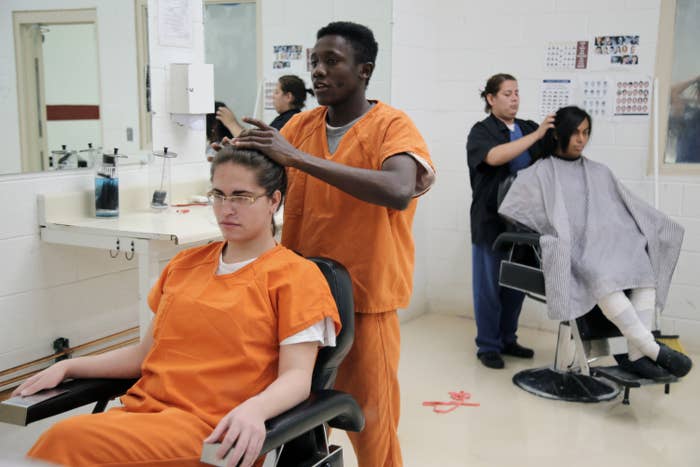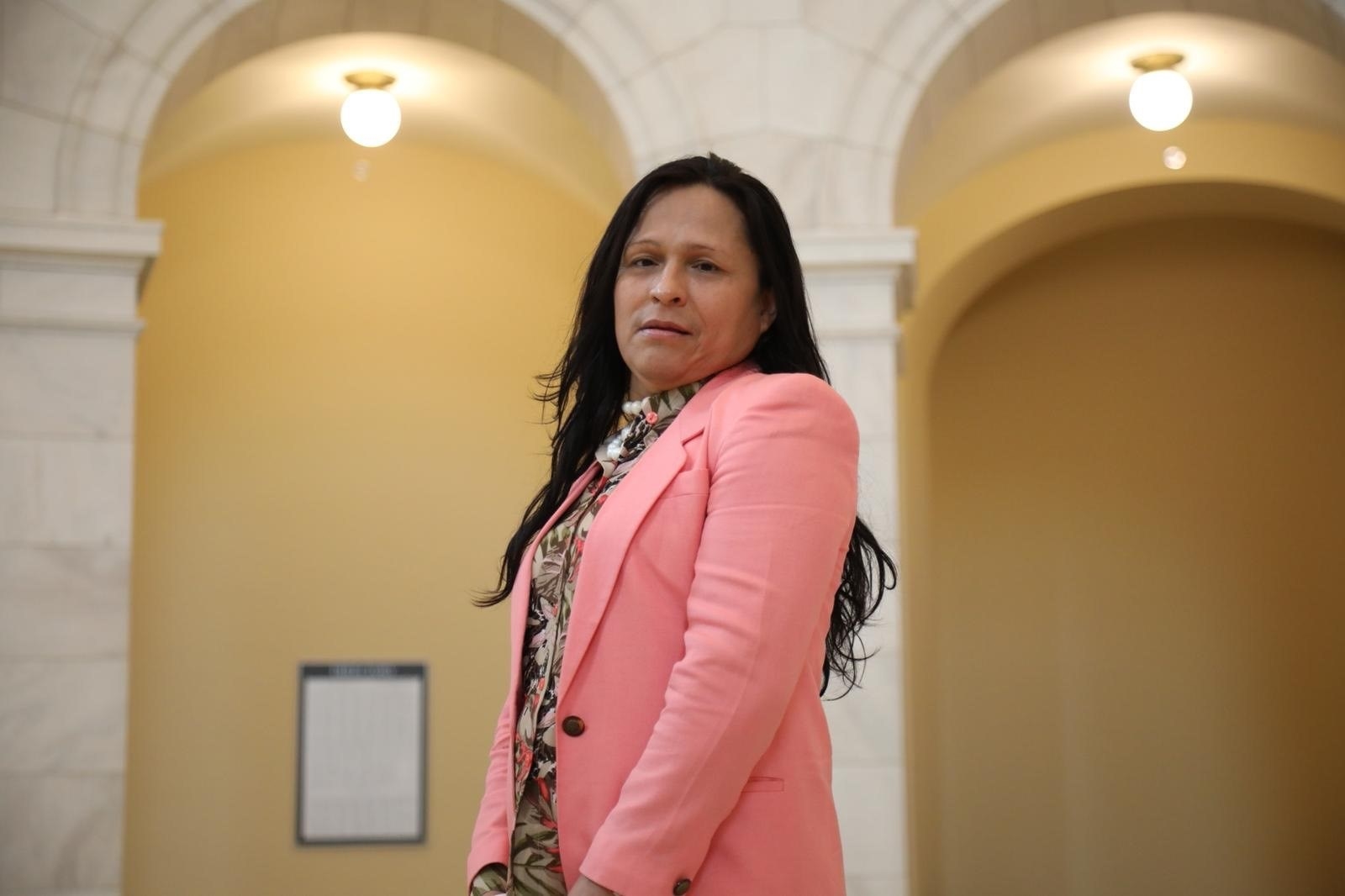
A transgender immigrant locked up by Immigration and Customs Enforcement in a private, remote New Mexico jail told staff she was bleeding from her rectum — and then had to wait 13 days for urgent medical care, according to a secret memo sent by a top Department of Homeland Security official to ICE leadership and obtained by BuzzFeed News. When the woman was finally tested, the memo said, “it was determined she had HIV.”
“The negligence of addressing a medical emergency such as this not only placed the infected detainee at risk for severe medical complications,” wrote Dana Salvano-Dunn, director of the compliance branch for the DHS Office for Civil Rights and Civil Liberties, “but it also exposed other detainees and facility and ICE staff to an infectious and potentially deadly disease.”
The Aug. 21, 2019, email revealed how immigrants at Cibola County Correctional Center — the only immigration jail with dedicated space for transgender women in the US — sometimes waited up to 17 days for urgently needed medical care, were exposed to poor sanitation and quarantine practices during a chickenpox and mumps outbreak, and didn’t get medications as directed by a doctor for illnesses such as diabetes, epilepsy, and tuberculosis. The advisers also said they saw immigrants in the transgender unit housed in an area that was not “appropriately cleaned and sanitized,” potentially contributing to the spread of infectious diseases.
ICE transferred a portion of its detainees at Cibola — 27 trans women and 15 others with chronic medical issues — out of the facility in January, roughly five months after the urgent email was sent detailing “the seriousness of the concerns raised.” Despite the concerns in August 2019, ICE had an average daily population of more than 100 detainees at Cibola every month through January, according to agency data reviewed by BuzzFeed News. As of Feb. 28, there were still 30 ICE detainees in the facility, according to the agency.
The email is the latest internal document to shed light on the issues with medical care immigrants receive in ICE custody. In December, BuzzFeed News revealed a whistleblower’s complaint that care at several facilities overseen by ICE was so dire, it resulted in two preventable surgeries, including an 8-year-old boy who had to have part of his forehead removed, and contributed to four deaths. The House Committee on Oversight and Reform has since launched an investigation.
CoreCivic, a private prison company, operates Cibola in the tiny town of Milan, New Mexico, more than an hour away from Albuquerque. (ICE’s sprawling detention system delivers medical care in several ways: At some facilities, ICE provides it directly; at others, a few ICE employees assist private or public contractors; and at many, it oversees care provided by a contractor.)

In a statement to BuzzFeed News, ICE spokesperson April Grant said the agency “is committed to ensuring that those in our custody reside in secure, humane environments and under appropriate conditions of confinement. The agency takes very seriously the health, safety and welfare of those in our care, including those who come into ICE custody with prior medical conditions or who have never before received appropriate medical care.”
An ICE official confirmed the email from the Office for Civil Rights and Civil Liberties — known as CRCL — to BuzzFeed News, saying that after receiving the “preliminary medical findings,” ICE “notified personnel from [ICE] Health Services Corps (IHSC), ICE detention oversight staff, field office leadership, and the facility operator, who coordinated to begin working on the issues raised by CRCL.”
The official said CoreCivic developed a 90-day “corrective action plan,” which included the “transition of medical care to a new provider” on Sept. 14, 2019. ICE officials visited the facility in December 2019 to determine compliance with its detention standards, and during the visit, “it was determined that the deficiencies were not yet fully resolved and that detainees with chronic care issues should be removed. ICE immediately coordinated the transfer of all those with chronic medical issues to other detention facilities.”
The official said the email from CRCL was sent in advance of a final report, which was pending as of March 4.
A December report by IHSC found issues beyond those raised in the August email, like the fact that laboratory tests were not being completed as ordered, delays in travel HIV medications for detainees going to immigration court, and medical staff not becoming familiar with detention standards. The agency said that beyond transferring some detainees, it also instituted a host of other changes, like having a phlebotomist complete all backlogged labs.
“The concerns raised by CRCL in its August 21 communication to ICE described health care conditions that presented a clear and present danger to the health of individuals residing at the facility,” said Marc Stern, a public health expert and a faculty member at the University of Washington School of Public Health. “This required an immediate response to protect the safety of residents, not a response 90 days later. Further, when the critical conditions were found not to have been resolved at well after 90 days, ICE still took no action to evacuate residents from the danger until the following month.”
Stern said the email indicated several serious issues that would affect any detainee at Cibola.
He said that if the “conditions have not been resolved — which it is not clear from DHS’ response they have been — those remaining un-evacuated individuals continue to be in danger of serious harm or death.”
The email from the civil rights division of DHS in August was addressed to several leading ICE officials, including Tae Johnson, assistant director of Custody Management at ICE.
“As you know, we recently were onsite at Cibola,” Salvano-Dunn’s email began. “Our doctor was very concerned about the medical care ... based on the review of urgent medical requests and interviews with detainees, Cibola medical staff are not responding to urgent medical requests timely. In several instances, we found that urgent medical requests were filed and were not responded to for approximately 13-17 days.”
She said the CRCL was providing ICE officials with a “top 5 list” of medical issues at the facility: access to emergency medical care, quarantine, chronic care, sick calls, and medical files and documentation.
The section on emergency medical care described how one detainee who went to the hospital several times for seizures put in a request for urgent medical care because they had not received their seizure medication. The detainee was not seen for 15 days.
“In this instance, the carelessness of the medical staff to respond to this request could have led to [a] seizure, or death,” the email stated.
The memo also said that Cibola staff should have had strict sanitation standards given that the facility faced an outbreak of mumps and chickenpox in April 2019, leading to dozens of inmates being quarantined. Investigators found that a nurse who was providing medication in an infected and quarantined area of the prison continued wearing the same pair of gloves as she provided medication to immigrants in the noninfected area of the jail, which could spread infection. The advisers determined that the monthslong quarantine at the facility was likely “related” to these “poor medical practices.”
The memo also detailed how individuals with “diabetes, epilepsy, and TB were not receiving their medications as directed by the doctor.” The facility’s “inability” to provide medications as prescribed could lead to illnesses becoming “intensified, leading to medical complications and potentially death.”
“Expired medication” was also found in the pharmacy, according to the memo. One detainee was continuing to receive the wrong dose of medication for days after the dosage had been changed.
"It is very concerning — you cannot run a clinic like this."
CRCL officials also found that sick calls were not responded to in a timely manner and that medical files were “incomplete, and missing documentation.” In one case, there was documentation of two different detainees within the same file, and it was unclear if there was a quality assurance process to make sure the files were accurate.
“This is not one red flag — these are major red flags of medical malpractice going on,” Paul Spiegel, director of the Center for Humanitarian Health at Johns Hopkins Bloomberg School of Public Health, told BuzzFeed News. “They just don’t meet the basic standards of care.”
The CRCL official noted in the email that they were aware that the medical care provider was going to be changing, and that some of the issues seemed exacerbated “by confusion” during the transition. She also said that CoreCivic had come to Cibola to “listen and address issues.”
Medical experts who reviewed the email said the issues raised were disturbing and indicative of systemic problems at Cibola that led to poor medical care. They also said ICE officials should have immediately made wholesale changes at the facility and moved inmates to other facilities after hearing of the issues in August.
“It is very concerning — you cannot run a clinic like this. You’re putting not just the patient at risk, but putting health care workers and other patients at risk too,” Spiegel said. “I’m surprised, if not astonished, that there are so many systemic failures in a place like this. This is very disturbing.”
Stern said the report is “highly serious and about as bad as it gets.”
“If this were a health department at a restaurant in a neighborhood, they’d slap a ‘closed for business’ sign on the door. Why wasn’t the facility closed the day the report was sent?” he said. “ICE detainees should have been immediately evacuated from the facility until ICE could prove that detainees could safely be housed there.”
In a statement, CoreCivic’s director of public affairs, Amanda Gilchrist, said detainees with “unique medical needs” were transferred from Cibola County while the facility “continues to work through this transition of providers.”
She also said that another company, Wellpath, provided medical and mental health care services to the inmate population at Cibola “during the relevant time period.”
Wellpath said in a statement that the company “strives to deliver the highest quality care to all patients. However, due to federal privacy laws, we are unable to comment as to the care provided in this case.”
Alejandra Barrera, a 45-year-old asylum-seeker from El Salvador who was housed in the Cibola unit for trans women beginning in December 2017, told BuzzFeed News the medical care was consistently substandard.

During her nearly two-year detention, Barrera said after repeated requests to fill a tooth went unfulfilled, she experienced an infection that required some teeth to be pulled months later. She said she saw another inmate not receive their HIV medication on time or enough of it when they did get it.
“It was really bad,” Barrera said. “It was never good for me or any of my companions who had health issues.”
The situation became so desperate for detainees, she noted, that they began to write letters to immigrant advocates and organizations across the country pleading for help.
“The point was to get people to hear our voices, to hear the complaints,” Barrera said. “But it didn’t lead to lasting change.”
Gilchrist said in her statement that CoreCivic is contractually required to adhere to federal Performance-Based National Detention Standards, and that ICE is deeply involved with maintaining oversight of its facilities.
“To ensure compliance and accountability, ICE maintains full-time, onsite staff who monitor conditions and contractual performance,” she said. “These officials have unfettered access at all times to detainees, CoreCivic staff, and all areas of our facilities.”
She also said all detention officers in CoreCivic’s ICE-contracted facilities are required to complete 160 hours of preservice training, as well as annual training on the dynamics of sexual abuse and harassment and guidance on respectful interactions with lesbian, gay, bisexual, transgender, intersex, and gender-nonconforming detainees. The training also emphasizes a “zero tolerance policy” regarding abuse, sexual abuse, and harassment, Gilchrist added.
Prior to ICE detainees being housed in the facility, the Nation documented a series of medical care issues and deaths at Cibola during a time when the Bureau of Prisons held noncitizen inmates there. The Department of Justice later ended its contract to house inmates at the facility in 2016 following the story.
Democratic aides became aware in January of the issues at Cibola, according to one congressional staffer. The aides were told that an internal ICE report in May 2019 said that there was a staffing shortage and sick calls not being responded to in a timely manner. The ICE officials conducted another site visit in August after becoming concerned about lack of reporting from the facility and found more issues, such as sick calls being ignored and lab work not being completed, the staffer said.
Reuters also reported that congressional aides described the reports documenting inadequate medical care at Cibola.
John Sandweg, the former acting director of ICE under the Obama administration, said the August report and subsequent issues at Cibola reaffirms his belief that there are inherent issues with immigration detention.
“There is no safe way to run ICE detention,” he said.
Detention numbers peaked in summer 2019 when around 55,000 immigrants were in custody in local jails and private prisons across the country. DHS had to transfer money earmarked for disaster relief and other efforts to pay for the expansion. As of late February, the agency was holding more than 38,000 people in custody, thousands of whom passed their initial asylum screenings, a practice that in the past generally led to them being released from custody.
Sandweg said he believes the majority of officers and ICE officials care about detainees, but that that the environment and overuse of detention makes it impossible to provide adequate care.
ICE spent more than $3 billion to detain immigrants across the US in fiscal year 2019, which ended in October.
“Why are we spending so much money detaining these people when there are these challenges?” Sandweg said. “We don’t need to rely on detention like we do.”
